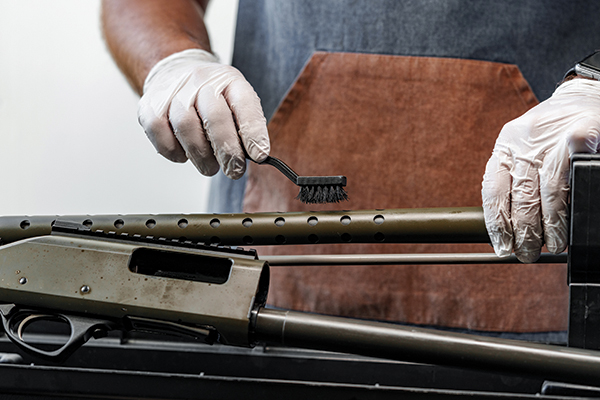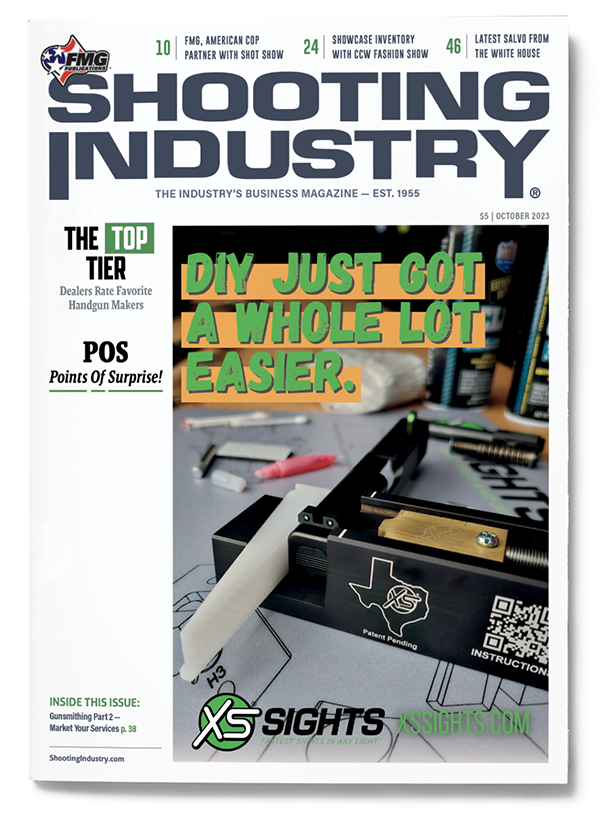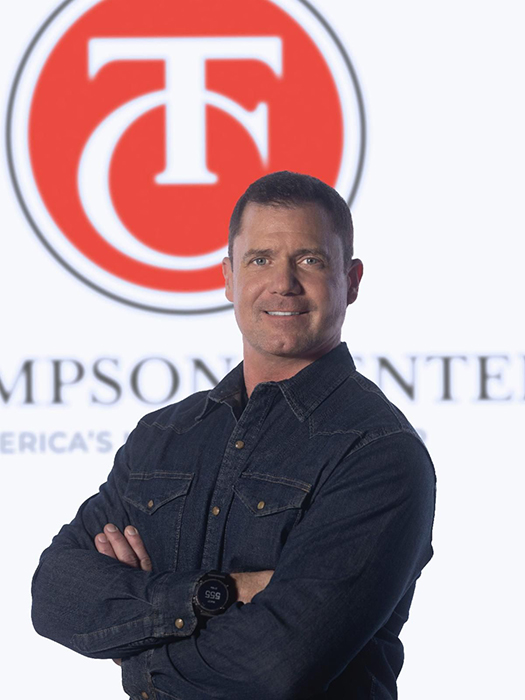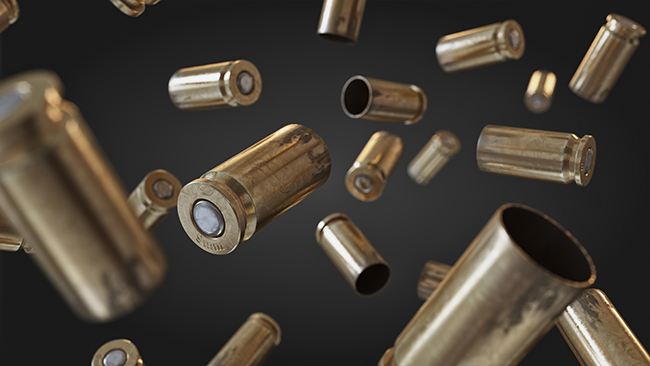Gunsmith In The House!
A resident gunsmith attracts new customers and galvanizes customer loyalty, but retailers follow their instincts to market their gunsmithing services.
Gene Kelly, owner of the American Gunsmithing Institute, says there’s no doubt a resident gunsmith is a marketable asset for a firearms retailer. A gunsmith who does quality work and completes jobs in a timely manner adds value to a store and ultimately helps a retailer move more product.
“People trade phone numbers of good gunsmiths like market analysts trade stock tips,” Kelly stated. “Once word gets out a guy is a competent gunsmith, it can happen quickly. If a gun shop owner is smart, he’s going to market it. He’s going to send a notice to his customer list. ‘This is his pedigree.’ If he’s trained by AGI, you’ll highlight it. He specializes in X, Y and Z and you’ll get your firearms quickly.”
Marketing is essential, but there is no standard marketing method among retailers. Even though the firearms industry has discovered the marketing power of the internet and social media, many retailers still rely — very successfully — on word of mouth to promote their gunsmith services.
Reputation Is Key
Matt Perry, owner of Buckhorn Gun Shop in Meridian, Idaho, shared that reputation carries a lot more clout than advertising for gunsmith services. If your ’smith is good, word of mouth will bring in as much work as he can handle. It works the other way, too, and no amount of advertising can polish a tarnished gunsmith. Either way, the gunsmith carries a store’s reputation on his shoulders.
“Gunsmiths are a brand unto themselves,” Perry remarked. “Either you’re good at it or you’re not, and if not you’re not, you won’t be in business very long.”
Perry has owned his shop for 22 years; gunsmithing accounts for about 20% of his business. He employs two gunsmiths to perform trigger upgrades or adjustments, install accuracy-enhancing components, thread barrels for suppressor installation, install muzzle brakes and glass bed rifle actions.
“They might bring in a brand-new gun to us they bought at Bass Pro Shops or Cabela’s they’ve never fired,” Perry said. “We don’t have to advertise too much. The thing about gunsmiths is if they’re not any good, they’re not going stick around. It’s like a good restaurant. They don’t have to advertise or be right on ‘Main Street.’ I don’t have to advertise. Gun repairs walk in my door every day just by word of mouth.”
For Perry, word of mouth has an amplifier. Buckhorn’s gunsmith is widely known as an expert on Colt Single Action Army revolvers. A well-known firearms journalist in the area frequently mentions Buckhorn Gun Shop in national articles about the subject, which brings in business from around the country.
“I’ve got a customer in Maine who came to me through one of his articles,” Perry recalled. “He told me if we’re good enough for John, we’re good enough for him.”
Social Clubs
Like Perry, Sean Dunaway, owner of Dunaway Custom Arms in Forest Lake, Minn., contends word of mouth is the most powerful voice for his shop’s gunsmith services. Unlike Perry, Dunaway believes social media is a powerful marketing vehicle. He maintains a prominent presence on popular social media platforms by frequently posting items about gunsmithing topics.
“We try to do several posts a week,” he noted. “I don’t like to go overboard with it. In our industry, we get a lot of social media from other businesses, and some of it is way too much. We just try to get people to interact. If we just built a custom rifle or re-barreled a rifle, we throw out the information about it and then ask something like, ‘So, if this was your project, what caliber would you lean toward?’ Getting interaction is what grows the posts and keeps people visiting.”
The downside to social media is the ability of trolls and cranks to corrupt or hijack threads. Likewise, a rude response can reflect badly on the business.
“We just keep it positive,” Dunaway stated. “We give them a respectful, positive message in response to their question. We hide posts that don’t stay on topic.”
Dunaway also uses social media to encourage hunters to bring their guns in for service leading up to major hunting seasons. It is a subtle way of promoting and building enthusiasm for hunting, translating into commerce.
“I always try to remind the customers what seasons are coming up to get them thinking about it, especially as far as the gunsmithing aspect is concerned,” he shared. “We encourage them to get their guns in early before we get a big pile we can’t turn around quickly. If we spread it out, it always works better, and we have happier customers.”
While traditional-style firearms and shotguns often require the services of a gunsmith, people who own modern sporting rifles are fond of customizing their guns themselves. Dunaway said do-it-yourself clinics for this segment of his clientele aren’t convenient. He doesn’t have the space for this kind of activity and his staff doesn’t have the time.
“I’ve seen a lot of places that offered build classes, but I never got into it. We don’t have a space where we can throw six to eight people in with benches and stuff to make it a good experience,” he explained.” If we had the space, I might consider it — possibly.”
A gunsmith who does quality work and completes jobs in a timely manner adds value to a store and ultimately helps a retailer move more product.
Scattershooting
Dallas Kaufman, owner of JLM Shooters Supply in Urbandale, Iowa, uses every means available to market his gunsmithing services. He does weekly segments on multiple outdoor radio programs, and he advertises in several print publications distributed in local grocery stores. He sponsors hole cards at several golf courses and he posts a blog.
All of those elements drive business to a degree, but like the other dealers quoted here, word of mouth still conveys the most credibility.
“We’ve been an active shop in the Des Moines area since 1989 and we’ve built a name for ourselves,” Kaufman said. “People come in here from all over the state.”
Most of Kaufman’s marketing efforts are passive. He avoids social media because the amount of time it takes to feed the machine does not reciprocate an equal amount of business.
“We do not do social media,” Kaufman stated. “It’s one of those things that’s just another pain in the rear to deal with. We stay busy enough without it.”
Maintaining a presence on media that is notoriously unfriendly to the shooting community is also challenging. Kaufman’s Facebook page, for example, had 6,000 followers before Facebook shut it down.
Kaufman acknowledges the potential of DIY build classes for modern sporting rifles, but he feels it also falls into the “PITA” category. A build project can easily turn into a manufacturing project that can produce red tape and create a potential existential crisis.
“We would not have build classes,” he informed. “There’s a lot of gray area with it with the ATF. They have been cracking down on assembling ARs. If somebody brought me a stripped lower, I’d have to have a manufacturer’s license to do it. Then I have got to engrave it with our name and give it a unique serial number. Within 24 hours, I have to notify ATF because now I’ve got a gun with a new and unique serial number, and also the owner has to do the paperwork a second time.”
Traditional firearms generate enough work for many retailers to spurn the AR-15 build arena, and there are a lot of ways to attract gunsmith business. Over time, retailers have refined the methods that work best for them.
Editor’s Note: This is part two of a three-part series on adding a gunsmithing segment to your business. Next month, Bryan Hendricks concludes by answering the million-dollar question: Can gunsmithing be profitable for your business? Have a reaction to this story? Contact us anytime: editor@shootingindustry.com.





